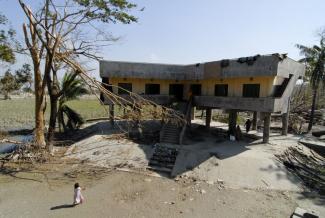Our view
Overwhelmingly positive progress

That stance is wildly exaggerated. Empirical data tell a different story. Life expectancies have increased dramatically. In 1960, the world population’s average life expectancy was 52 years, by 2010 it had risen to 70 years. In Africa, the poorest continent, the increase was from 40 years to 57 years. Europeans can now expect to live 80 rather than 69 years. Before the Industrial Revolution, life expectancy was about 35 years.
Not only are we getting older, our number has increased dramatically. In 1960, not quite 3 billion people inhabited earth. Now we are more than 7 billion. Nonetheless, the share of undernourished people has gone down. In 1970, more than one third of the people living in developing countries did not get enough food. By 2015, the ratio had declined to less than 15 %. Today, twice as many people are overweight as are undernourished.
In the 1950s, natural disasters annually claimed nine lives per 100,000 people. In the past ten years, the comparative figure was one per 100,000. Disasters have not become less forceful or less frequent. Infrastructures have improved.
Overwhelmingly positive trends of this kind are thoroughly assessed in “Enlightenment Now”, a new book by Steven Pinker, who teaches psychology at Harvard University. It considers deaths due to road accidents, diseases and war. Pinker takes account of human rights, incomes and life satisfaction. He provides ample evidence of reason, science and humanism having led to dramatic progress. He argues that this recipe can lead to yet more progress.
Pinker deserves attention. He does not suggest that everything is fine and will only get better. On the contrary, he warns that we risk forsaking institutions and norms that have served us well if we underestimate what we have achieved. Pinker spells out clearly that human beings are not by nature reasonable creatures. His point is that we are endowed with reason and should make good use of this capacity.
To drive progress, we must adopt intelligent policies based on diligent analyses and empirical evidence. Ideological purity and romantic yearning for the past will not help us to cope with global challenges like climate change, terrorism and economic slumps.
Irrational attitudes are becoming more forceful and more dangerous. The Harvard scholar warns that the way western nations practice democracy compounds the problems. He argues that elections increasingly resemble sports events, with citizens identifying with one team and resenting the other the way spectators do. It would make more sense to make and implement policies according to the model of scientific experiments. Campaign slogans and polemical agitation prevail where nuanced hypotheses and diligent number crunching are needed. Media pundits would do a better job if they carefully weighed arguments instead of reinforcing their audience’s entrenched world view.
We have made progress, and further progress is both possible and urgently needed – in particular in regard to climate protection. We should improve the development paradigm that has served us well, not abandon it.








